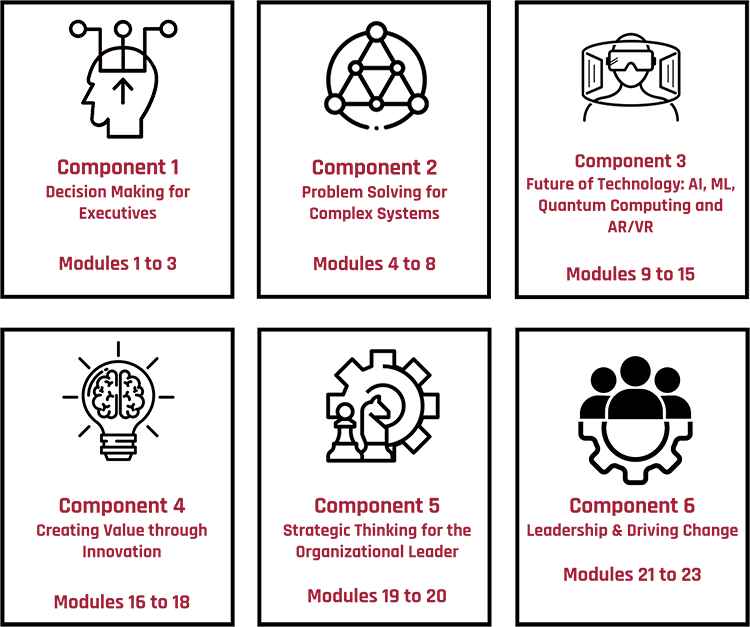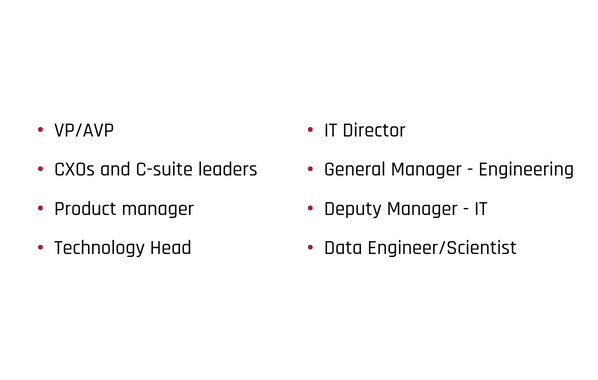The benefit of learning together with your friend is that you keep each other accountable and have meaningful discussions about what you're learning.

Courtlyn
Promotion and Events Specialist
Manage both people and technology with excellence
Download Brochure
May 14, 2024
9 Months, Online
4-6 hours per week
₹3,85,000 and get ₹35,000 off with a referral
Participants report that enrolling in a program with colleagues fosters collaborative learning and amplifies their impact.
Please provide your details to get more information about the group-enrollment pricing.
The benefit of learning together with your friend is that you keep each other accountable and have meaningful discussions about what you're learning.

Courtlyn
Promotion and Events SpecialistUpcoming Round Application Deadline: May 2, 2024
In today's technology-driven world, leaders need to combine technological skills with business acumen to succeed.
MIT xPRO has launched its Post Graduate Certificate in Technology Leadership & Innovation to support professionals in this endeavor. MIT faculty have developed this unique program, covering the key competencies required to emerge as a technology leader and drive innovation in your organization. More than 15 MIT faculty have distilled their expertise on key technology accelerators, along with principles of organizational strategy and leadership, into the nine-month MIT xPRO Post Graduate Certificate in Technology Leadership & Innovation program.
Pre-recorded videos* for self-paced learning from renowned MIT faculty
Discussion
Assignments**
Workbooks
Quizzes
Activities
Note:
*This is a self-paced online program. Thus, faculty will not be a part of weekly live sessions or any other live interaction in
this program. We have a curated panel of eminent industry practitioners who will be conducting the weekly live
doubt-clearing sessions.
**Assignments are graded either by industry practitioners who are available to support participants in their learning journey
and/or by the Emeritus grading team. The final number of quizzes, assignments and discussions will be confirmed closer to the program start.

Application of learning through a final capstone project & simulation on strategy and management

Individualized feedback on assignments

Weekly live office hours with Q&A (learning facilitator led)

Access to cutting-edge technologies and concepts from MIT

Earn a certificate from MIT xPRO
Managers with minimum 10 years of work experience
Who are moving up in their career quickly and want to prepare for the next phase of leadership especially in technologically empowered industries/departments
VP or CXOs/ C-suite level executives
Who are leading verticals centred and are tasked with implementing innovation to automate processes, improve efficiencies, cut out waste and improve their department’s performance with the help of technology
Individual contributors
Who want to understand from an Indian context how the latest technologies work to help further their organisation/client’s future plans and put them at the forefront of emerging technologies
Entrepreneurs
Who want to stay ahead of the curve by leveraging transformative technologies and solutions










The famous mission that everyone knows about. But with so many decisions to be made, so many things to do, how do you being this process? How does a team plan a mission to the moon? Get to know the detailed decision-making process that the Apollo team used, understand how they were able to differentiate between the architectural decisions that were needed to be made on priority versus others that could be made later.

IKEA is one of the biggest furniture retailers in the world and specialises in ready-to-assemble furniture. The IKEA ODGER project is one of the stalwarts of the IKEA lineup and is a perfect blend of customer understanding, organizational strategy and innovation. This case peeks at the key creative motivations of IKEA and defines the culture of the company.

Spyce is a fast-casual ‘robotics’ restaurant which cooks complex meals to order. The company, founded by four robotics-obsessed MIT engineers has recently raised a round of funding in Series A and is exploring multiple avenues to invest that money. Does Spyce expand the number of restaurants, or should it pivot to a franchising model, or better yet, could it license out the technology and take a serious turn?

Personal computers are a luxury that man developing countries can’t afford or reach. That’s where MIT D-Lab in collaboration with partners developed a platform to use any smartphone or television already existing in the household to offer at-home computing solutions. Explore and learn about the strategic decisions that shaped the development journey.

Toyota, a globally renowned name in automobiles. But there have been many unintended acceleration issues in many of their vehicles. Why was this the case? Was it sensors, software or sticky pedals and floor mats? Deep dive into the investigation and understand how concepts like critical thinking & decision making were used and abused.

Want to know how to make a custom robot? See how system-thinking makes this possible by compiling parts from a database. Explore how easy is the process of fabricating a robot by understanding each of the computation-driven steps.


Get recognized! Upon successful completion of this program, MIT xPRO grants a certificate of completion to participants. This program is graded as a pass or fail; participants must receive 70% to pass and obtain the certificate of completion.
Download BrochureAfter successful completion of the program, your verified digital certificate will be emailed to you, at no additional cost, in the name you used when registering for the program. All certificate images are for illustrative purposes only and may be subject to change at the discretion of MIT.
Option 1
Program Fee: INR 3,85,000
Maximum Loan Amount: INR 4,54,300
Tenure (months): 12
EMI/ month: INR 41,455/-
Option 2
Program Fee: INR 3,85,000
Maximum Loan Amount: INR 4,54,300
Tenure (months): 24
EMI/ month: INR 22,526/-
Option 3
Program Fee: INR 3,85,000
Maximum Loan Amount: INR 4,54,300
Tenure (months): 36
EMI/ month: INR 16,216/-
Option 4
Program Fee: INR 3,85,000
Maximum Loan Amount: INR 4,54,300
Tenure (months): 48
EMI/ month: INR 13,061/-
Option 5
Program Fee: INR 3,85,000
Maximum Loan Amount: INR 4,54,300
Tenure (months): 60
EMI/ month: INR 11,168/-
Also available in 6/9/18/30 months EMI plans.
Flexible payment options available.